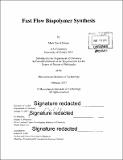| dc.contributor.advisor | Bradley L. Pentelute. | en_US |
| dc.contributor.author | Simon, Mark David | en_US |
| dc.contributor.other | Massachusetts Institute of Technology. Department of Chemistry. | en_US |
| dc.date.accessioned | 2018-09-17T15:50:24Z | |
| dc.date.available | 2018-09-17T15:50:24Z | |
| dc.date.issued | 2017 | en_US |
| dc.identifier.uri | http://hdl.handle.net/1721.1/117929 | |
| dc.description | Thesis: Ph. D., Massachusetts Institute of Technology, Department of Chemistry, 2017. | en_US |
| dc.description | Cataloged from PDF version of thesis. | en_US |
| dc.description | Includes bibliographical references (pages 125-129). | en_US |
| dc.description.abstract | This thesis describes the development and application of fast flow solid phase synthesis for the preparation of peptides and phosphorodiamidate morpholino oligomers (PMOs), as well as the application of fast, reliable peptide synthesis to study non-natural protein folding and function. In the first chapter, solid supported peptide synthesis was accelerated using flow by continuously delivering preheated solvents and reagents to the solid support at high flow rate, thereby maintaining maximal concentrations, quickly exchanging reagents, and eliminating the need to heat reagents after they were added to the vessel. In the second chapter, these chemical principles were expanded upon and mechanical challenges particular to accelerated solid phase synthesis were overcome to build a fully automated fast flow peptide synthesizer than incorporates amino acids in as little as 40 seconds each. First, mechanical systems were developed to rapidly switch between the many reagents needed for peptide synthesis while maintaining the proper stoichiometry of all reaction components at all times. Second, conditions under which reagents did not appreciably degrade during storage or synthesis were found. Finally, synthetic outcomes were substantially improved by increasing temperature without degrading the protected, resin bound peptide. The third chapter describes the expansion of fast flow synthesis to PMOs. A 10-fold acceleration of PMO synthesis was realized using mechanical systems adapted from chapter 1, increasing the reaction temperature to 90°C, and introducing a Lewis acid catalyst. The acidity of the deprotection reagent was reduced to prevent cleavage of the backbone during 3' detritylation. In the final chapter, a "D-scan" of two small proteins, the disulfide-rich Ecballium elaterium trypsin inhibitor II (EETI-II) and a minimized Z domain of protein A (Z33), is reported. For each protein, the chirality of one amino acid at a time was inverted to generate a series of diastereomers, and study the critical stereocenters of EETI-I and Z33. Twelve out of 30 EETI-II analogs folded and were high-affinity trypsin inhibitors, but most active analogs were less stable to reduction than EETI-II. Similarly, twelve Z33 analogs retained high binding affinity to IgG, but most were substantially less stable than WT-Z33. | en_US |
| dc.description.statementofresponsibility | by Mark David Simon. | en_US |
| dc.format.extent | 435 pages | en_US |
| dc.language.iso | eng | en_US |
| dc.publisher | Massachusetts Institute of Technology | en_US |
| dc.rights | MIT theses are protected by copyright. They may be viewed, downloaded, or printed from this source but further reproduction or distribution in any format is prohibited without written permission. | en_US |
| dc.rights.uri | http://dspace.mit.edu/handle/1721.1/7582 | en_US |
| dc.subject | Chemistry. | en_US |
| dc.title | Fast flow biopolymer synthesis | en_US |
| dc.type | Thesis | en_US |
| dc.description.degree | Ph. D. | en_US |
| dc.contributor.department | Massachusetts Institute of Technology. Department of Chemistry | |
| dc.identifier.oclc | 1051223607 | en_US |
